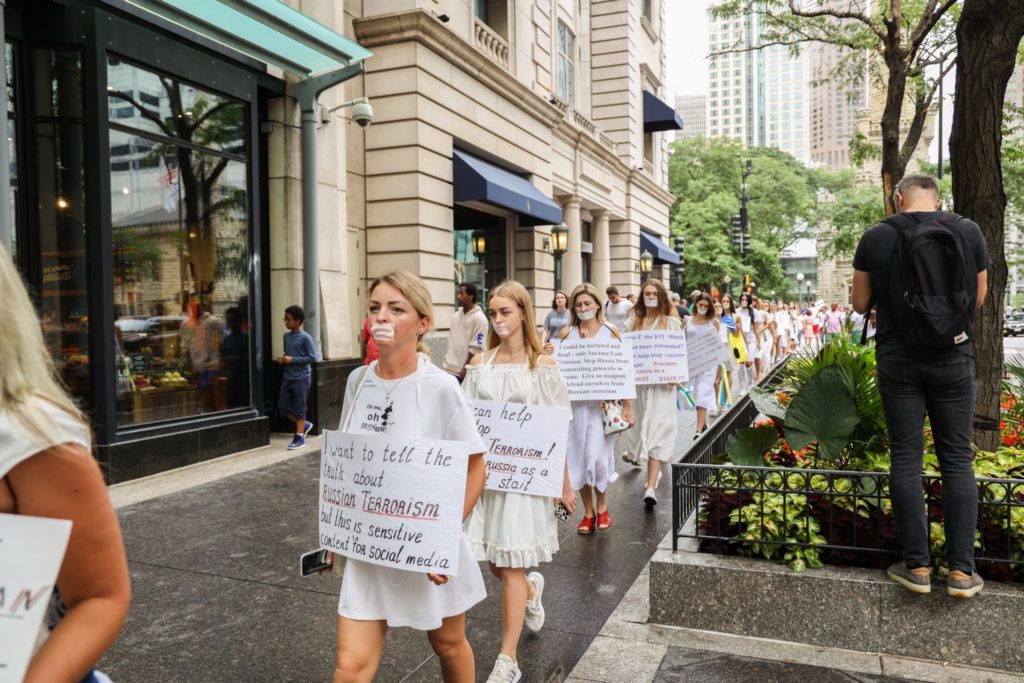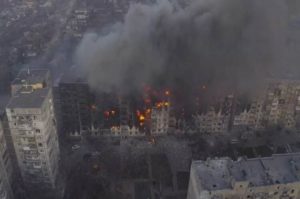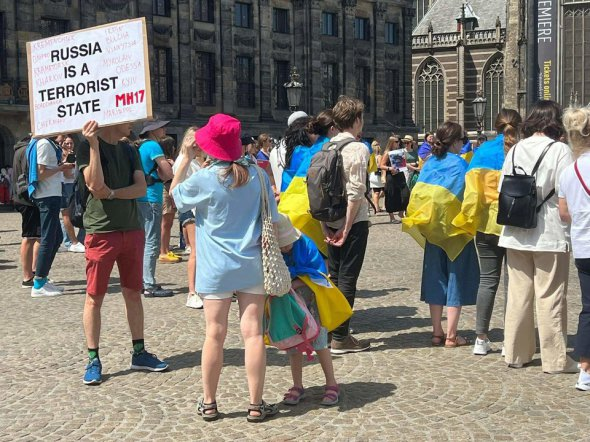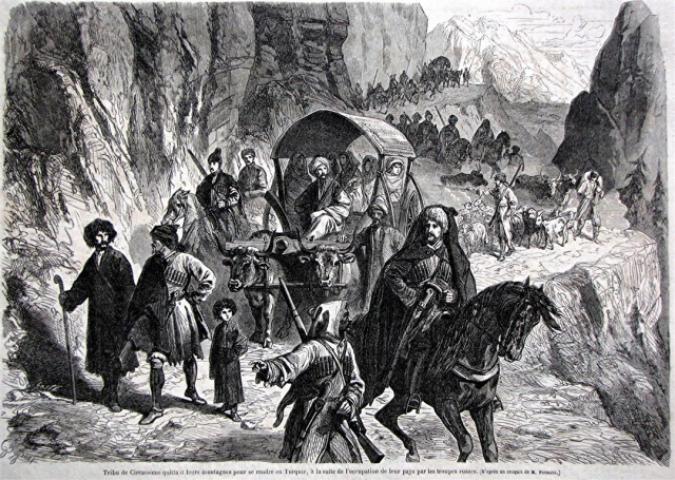Russia supports the "DNR," the "LNR," the Wagner Group, Hezbollah, and the Taliban. The Chechen wars, the downing of MH17, and the poisoning of political opponents have added to the list of terrorist activities Russia accused of. After Russian missile attacks on Ukrainian civilians in July, the Biden administration faced increased pressure to name Russia as a state supporter of terrorism. Yet, detractors say it would damage future negotiations with Russia. Here are four reasons the US should still make the jump and designate Russia as a state sponsor of terrorism.
1. Designating Russia as a sponsor of terrorism is not just a symbolic measure, it holds severe consequences
On 27 July, the US Senate passed a resolution requesting that Secretary of State Anthony Blinken designate Russia as a state sponsor of terrorism. In response to the resolution, Blinken claimed that designating Russia as a state sponsor of terrorism would have no meaningful effect:
“The costs imposed on Russia by us and other countries are entirely consistent with the consequences of being designated as a state sponsor of terrorism," Mr Blinken said. "As a result, the practical consequences of what we're doing are the same."
- introduce sanctions and various measures against those individuals and third countries that trade with Russia;
- severely complicate the ability of international companies to conduct business in Russia, thus encouraging those who have not yet left Russia to do so, and accelerating the economic decline in Russia
- waive traditional legal barriers that prevent American citizens from suing foreign governments for damages in the US courts;
- waive diplomatic immunity from Russian officials;
- limit further or end altogether diplomatic relations with Russia, dealing a symbolic blow to the state.
The Biden administration is likely hesitant to designate Russia as a terrorism sponsor because of the implications for third-party countries, including the EU, for doing business with Russia. This could force the US to impose restrictions on EU firms, which the administration wishes to avoid. Yet, according to the Ukrainian government, this is precisely what needs to be done to limit Russia's ability to wage further war. Ukrainian President Volodymyr Zelenskyy stressed:
"The United States' formal legal recognition of Russia as a terrorist state is required not as a political gesture, but as an effective defense of the free world. This decision will make it difficult for the terrorist state to exist, as well as cut various political and business ties that Russia would otherwise maintain."
Jason Blazakis, 2008-2018 director of the US State Department’s Counterterrorism Finance and Designations Office in the Bureau of Counterterrorism, confirmed Zelenskyy’s claims, saying “The impacts [of designating Russia a state sponsor of terrorism] would be quite severe.”
“Adding Russia to the State Sponsor of Terrorism regime would have implications for every government that continues to engage in any exchange, especially defense-related, with Russia.
I know firsthand from experience that this is a reason why countries are not often added to the SST list—it complicates these second-order relations.
Yet, in the case of Russia, adding it to the list is important for this very reason. The US government should want to complicate every aspect of another country's relationship with Russia.”
The EU's strong economic reliance on Russian energy exports would not be a problem because the US president could temporarily waive some economic restrictions with Russia until the EU can wean itself off Russian energy exports.
![]()

2. Due to the failure of negotiations, different means of pressure must be applied to end Russia's invasion
Following the latest meeting on 18 August 2022 with Turkish President Recep Tayyip Erdogan and UN Secretary-General António Guterres, Ukrainian President Volodymyr Zelenskyy stated that negotiations with Russia are only possible after Russian troops leave Ukrainian territory and that Russia cannot be trusted – a message Ukrainian authorities have been repeating many times since May 2022, after Ukraine won the battle for Kyiv.
Such an approach is supported by Ukrainian society: only a mere 18% of Ukrainians are ready to make territorial concessions to Russia to end the war. Putin, for his part, declared that he is fighting the entire West in Ukraine and that making concessions would make him appear weak and undermine his domestic authority.
Any concessions to Putin on Ukraine will mark end of the West, Skobov warns
There is no room for substantive negotiations until either Ukraine or Russia makes a military breakthrough on the frontlines.
Under these circumstances, the West should put additional pressure on Putin so that Russia can no longer wage war. Designating Russia as a state sponsor of terrorism is one of the instruments available to the US to further stymie any economic deals with Russia.
Designating Russia as a terrorism sponsor is especially important given the West's former approach of tolerating Russian crimes and building economic relations in the hope that Russia would one day democratize failed miserably.
In a speech, Ukraine's Permanent Representative to the UN highlighted that the appeasement strategy toward Russia has failed numerous times since the brutal battles in Chechnya. Each subsequent unpunished crime committed for the sake of economic and diplomatic ties simply fueled Russian appetites for more. Only the most severe measures can now deter Russia.
Russia became a UN Security Council member without procedure & the next cases of special treatment of Russia despite invasions of Chechnya, Georgia, Ukraine, & Syria fed the Putin's regime, Permanent Representative of Ukraine to the UN recalled in a speech https://t.co/LFOYovcCut
— Euromaidan Press (@EuromaidanPress) June 22, 2022
The US State Department warned Congress that bringing terrorism charges against Russia could jeopardize the country's already precarious POW and grain agreements. However, it should be remembered that Russia didn't agree to the "grain corridor" from Ukrainian ports until Ukrainian troops expelled Russians from Zmiinyi (Snake) Island, which lay on the key grain caravan route. It's clear that, when pressure is applied, Russia is forced to make concessions which result in small yet significant wins for Ukraine.
Furthermore, it is believed that Russia violated international norms of conducting war by murdering over 50 Ukrainian POWs at Olenivka, a jail where a terrorist attack occurred (investigation still ongoing). This attack was considered a show execution for other POWs detained in Mariupol. Therefore, if Russia cannot adhere to standard rules of war, diplomacy is impossible with the current regime.
From Russian propaganda coverage to how a HIMARS strike actually looks like - here is everything we know so far about the murder of Ukrainian POWs in Olenivka prison, for which Ukrainian authorities are calling to designate Russia a terrorist statehttps://t.co/kNFnE3yipV
— Euromaidan Press (@EuromaidanPress) July 31, 2022
3. Russia committed both war crimes and sponsored terrorism of other groups
It is often claimed countries are designated as sponsors of terrorism for supporting third parties that are committing terrorist attacks.
However, countries are not normally recognized as terrorism sponsors for utilizing governmental institutions to target innocent people. The latter is fundamentally a war crime that should be dealt with by a tribunal.
Although Russian war crimes and missile attacks on civilians are not legally required for it to be designated as a state supporter of terrorism, Russia has also backed private terrorist organizations, which is one of the preconditions of being designated a state sponsor of terrorism.
The US legal mechanism to designate a country as a state sponsor of terrorism can be applied “for repeatedly providing support for acts of international terrorism, and to curtail aid or trade to that country as a result,” notes the Congressional Research Service (CRS).

Russian war crimes, despite being horrifying and sometimes referred to as state terrorism, are not required for its designation as a sponsor of terrorism. In fact, when a state is unable to achieve its goals through conventional warfare, as Russia is currently facing in Ukraine, it often resorts to striking civilians with missiles or torturing them to exert psychological pressure. Ivan Goma, a Ukrainian political scientist, writes:
“Terrorists aim to force the opponent’s government to a desirable course of action through sheer destruction, bloodshed, and suffering. In political theory, this is called costly signaling, and the signal here is the following: we are prepared to do whatever it takes to get it our way, so back [down]. During wars, the desperate side is also tempted to resort to costly signaling.
Typically, shelling hospitals, civilian infrastructure, and indiscriminate violence bring the same message to the oppos[ing] government and the population: ‘Unless you yield, we will do whatever it takes to bludgeon you into submission.'”
A fundamental Russian tactic is blackmail by terror, which, as the Lithuanian Parliament officially stated, became a powerful emotional backdrop for designating Russia as a terrorist state.
"The Russian Federation, whose armed forces deliberately and systematically select civilian targets for bombing, is a state that supports and carries out terrorism," the resolution says.
However, from a legal standpoint, Russia may only be designated for funding third parties that perpetrated terrorist actions. It is not uncommon for Russians to act in this manner, and many accounts have been documented.
- a campaign of terror targeting civilians during the Second Chechen War;
- supporting so-called separatists engaging in acts of violence against Ukrainian civilians in the Donbas region since 2014;
- targeting innocent civilians in Syria since 2015 with attacks on civilian markets, medical facilities, and schools;
- providing material support to Syria, a nation currently designated as a state sponsor of terrorism, that has been used to target the Syrian people;
- supporting private military networks of mercenaries, such as the Wagner Group, that spread terror. Yet, speaking from a purely legal perspective, Russia can be designated only for sponsoring third parties who committed terrorist acts. And there are enough examples of this Russian behavior. The resolution of the US Senate from 27 July, calling on Mr. Blinken to designate Russia as a state sponsor of terrorism, gives a lengthy list of Russian crimes that include both war crimes and precisely those cases of supporting terrorist organizations that legally greenlight designating Russia a sponsor of terrorism;
- actions of the Russian Federation in Ukraine against innocent civilians and civilian infrastructure that are state terrorism;
- numerous summary executions against innocent civilians in Ukraine.
The Wagner Group: A Russian creation known for its terroristic activities
Russia has also created domestic private military companies engaged in terrorism, such as the Wagner group, supervised directly by Putin and his close confidant Yevgeny Prigozhin.
Putin’s shift on Skripal case makes a broader war more likely, Pastukhov says
Wagner Group, a private military company (PMC), has committed war crimes in Ukraine's occupied territories since 2014. There are also documented cases of Wagner Group massacres, executions, and falsified graves throughout the Middle East and Africa, lending credence to Russia's designation as a state sponsor of terrorism.
Russian Wagner Group mercenaries, for example, staged evidence of French atrocities near an army base in Gossi, northern Mali. Furthermore, at the end of March 2022, Malian armed forces (FAMa), aided by Wagner troops, massacred over 300 civilians in the central Malian town of Moura, marking the worst atrocity in Mali's decade-long conflict.
In Syria, the Wagner Group was also accused of extrajudicial killings, torture, and rape. Finally, according to the most recent reports, the Wagner Group discussed murdering Ukrainian civilians in Bucha.
The Wagner Group is identified as a "designated Russian Ministry of Defense proxy force" by the Treasury Department, and "Wagner's activities in other countries, including Ukraine, Syria, Sudan, and Libya, have generated insecurity and incited violence against innocent civilians."
Furthermore, Russia oversaw and actively supported the "DNR" and "LNR" (Donetsk and Luhansk "People's Republics," Russian proxy statelets in Donbas that are designated as terrorist entities in Ukraine.
Ukraine nearly retook control of the Donbas region in 2014, destroying two-thirds of the "DNR" and "LNR" strongholds. Only direct military support from Russia, as well as widespread material support from Russia, enabled the "DNR" and "LNR" to survive and retain control of a third of the Donetsk and Luhansk Oblasts.
The Republican Study Committee's National Security and Foreign Affairs Task Force proposed designating Russia as a state sponsor of terrorism in a 120-page report released in 2020. The evidence it presented included Russia's military coordination in Syria with the Iranian Islamic Revolutionary Guard Corps and Hezbollah, support for the Taliban in Afghanistan, and the provision of chemical weapons for assassination purposes.
![]()

4. US rejected calls to designate Russia as a state sponsor of terrorism to save relations, achieving the worst bi-lateral relations in history
There have been numerous calls in the United States to identify Russia as a sponsor of terrorism. On 23 April 2014, following Russia's annexation of Crimea and the start of the war in Donbas, a petition to US President Barack Obama was formed on the White House website to classify the proxies as terrorist organizations.
It received over 100,000 signatures from people all across the world. The proposal, however, was rejected by the White House.
In connection with the poisoning of Sergei Skripal, Republican Senator Cory Gardner urged that Russia be added to the list of terrorist supporters in April 2018.
In June of that year, Ukraine filed a lawsuit with the United Nations International Court of Justice, requesting that Russia be designated as a terrorist sponsor.
Following Russia's full-scale invasion of Ukraine, the Ukrainian Parliament appealed to the US House of Representatives and Senate on 3 May 2022 to recognize the Russian Federation as a sponsor of terrorism.
Before that, on 14 April, the Ukrainian Parliament itself designated the Russian Federation as a terrorist state, introducing the term into Ukrainian law.
Furthermore, Zelenskyy went one further and requested that Biden designate Russia as a state sponsor of terrorism on 15 April 2022, but Biden failed to respond directly to this request, leaving Zelenskyy to reiterate his appeal in subsequent public addresses.
Even if the Biden administration decides not to designate Russia as a state sponsor of terrorism, Congress has the authority to do so, bypassing the Secretary of State.
- Related: How Russia justifies the murder of Ukrainians: Russia’s 2022 “genocide handbook” deconstructed
On 28 July, a bipartisan group of members of Congress introduced a new bill that would designate Russia as a sponsor of terrorism for review by the House of Representatives, thus bypassing the Biden Administration.
The resolution recalls crimes committed by the Russian regime, in particular support for criminal organizations in the temporarily occupied territories of Donbas and the Wagner group as well as terrorist actions in Syria, Sudan, and Libya, terrorist attacks in the United Kingdom, and the downing of Malaysia Airlines flight MH17
“It has been evident for years that Russia uses terrorism to pursue its goals, whether it targeting civilians in Ukraine or Chechnya, supporting Bashar al-Assad’s brutal actions against his own people in Syria, assassinating political opponents abroad, or using fronts such as the Wagner Group to shield its malign activities from public view," said Congressman Jared Golden.
"Russia’s atrocities against civilians in Ukraine make clear that the use of terror is a recurring feature of Vladimir Putin’s Russia and Congress must respond with decisive action. The bipartisan bill I am introducing with my colleagues today would hold Russia to account for its acts of terror.”
Western legal framework doesn't have a proper place for Russian crimes
Designating Russia as a state sponsor of terrorism is often opposed because Russia doesn't fit the list of other terrorism sponsors by its size and power, namely Cuba, North Korea, Iran, and Syria. The instrument of designating nations as sponsors of terrorism was developed to exclude and isolate those designated from international relations as much as possible.
It is clear such a step would put an end to the idea of somehow including Russia in Western civilization and will require serious reconsideration of international order and law.
Particularly given Russia's continued membership in the UN Security Council. However, when institutions and rules do not reflect reality, it is preferable to change them rather than allow them to become obsolete.
“Russia has become the largest terrorist organization in the world, and this must be a legal fact,” Ukrainian President Zelenskyy stated in June 2022, following the Russian strike at a shopping mall in Kremenchuk which he called “one of the most defiant terrorist attacks in European history.”
Russians fired missiles at a shopping mall in Kremenchuk, where more than 1,000 civilians could have been at the time, "The number of victims is hard to imagine" - Zelenskyyhttps://t.co/gjbomaOgWL https://t.co/vH4hUAZhT9 pic.twitter.com/mkBpS8vZv6
— Euromaidan Press (@EuromaidanPress) June 27, 2022
The attack killed 22 civilians and wounded 61, being only one in a series of Russian missile attacks on hospitals and trade centers.
There's one toddler among the 12 civilians killed by the Russian missile strike on Vinnytsia
"We appeal to the whole world! Immediately recognize Russia as a terrorist country with all the political consequences of such a decision!" - Emergency Servicehttps://t.co/lmeeDSRoev pic.twitter.com/OfIb3UczrV
— Euromaidan Press (@EuromaidanPress) July 14, 2022
Related:
- 24 years ago, Moscow attacked Chechnya, triggering a war that changed everything
- Putin’s shift on Skripal case makes a broader war more likely, Pastukhov says
- How Russia justifies the murder of Ukrainians: Russia’s 2022 “genocide handbook” deconstructed
- Kremlin behaving toward Ukraine now the way it did toward Georgia before 2008 invasion, Portnikov says
- Kremlin’s food terrorism, explained: How Russia weaponizes famine, again
- “Russia, a terrorist country ruled by war criminals”: Full text of Russian decolonization conference resolution





